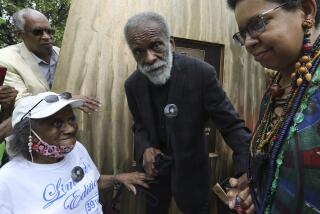Prosecutors Delay Using Ex-FBI Agent as Witness in Miller Case
In a major strategy shift, the prosecution in the espionage retrial of Richard W. Miller has rejuggled its witness list to avoid calling one of its most controversial witnesses--former FBI Agent John Hunt--early in the trial.
U.S. Atty. Robert C. Bonner gave no explanation for the decision, but Hunt’s testimony in the first trial was cited by jurors as one of the reasons for a jury deadlock last November.
In addition, Miller’s defense lawyers, Stanley Greenberg and Joel Levine, have made it clear that they plan to make Hunt’s role in the case even more of a defense issue in the second trial than they did in Miller’s first trial.
Hunt, 57, a retired FBI counterintelligence agent, testified early in Miller’s first trial that he had met repeatedly with convicted Soviet agent Svetlana Ogorodnikova beginning in 1982 in an effort to recruit her as an FBI informant before Miller became involved with her in 1984.
Hunt, who took the witness stand on the fourth day of testimony in the first trial, said he had been subjected to repeated sexual overtures from Ogorodnikova, but, unlike Miller, had spurned her romantic advances.
He testified over a three-day period that he had considered using Ogorodnikova as an FBI informant, but finally decided that she was too unreliable to be useful.
At one point, Hunt testified, he had instructed Ogorodnikova to describe him to the Soviets as a person who was married and liked “to get around and spend money.” But he denied that he was setting himself up for any possible double-agent role.
Jurors in the first trial later asked that Hunt’s entire testimony, along with that of two other witnesses, be reread to the jury while it was deliberating the case. One juror complained that Hunt’s testimony had tended to confuse the jury.
Jurors ultimately voted 10 to 2 to convict Miller on three charges and 11 to 1 to convict him on four remaining counts.
Frank Saylor, a member of the first jury who voted to convict Miller on all seven charges of espionage and related bribe-taking counts, said Hunt’s testimony was a factor in the decisions of both the jury holdouts.
“There was never any evidence presented against Hunt, but they felt maybe the FBI was favoring him over Miller,” Saylor said of jury holdouts Bobby Rivera and Virginia Hennes.
Other Testimony
While Hunt was in Los Angeles last week prepared to testify, the decision was made by Bonner to proceed instead with the testimony of two dozen other FBI agents involved in the surveillance operation that led to Miller’s arrest Oct. 2, 1984.
Miller, 49, is charged with conspiring with Svetlana Ogorodnikova and her husband, Nikolai Ogorodnikov, to pass secret FBI documents to the Soviet Union.
During five days of FBI questioning before his arrest, Miller allegedly confessed to six FBI agents, an FBI polygraph specialist and a former girlfriend that he passed at least one document to Ogorodnikova.
While declining to call Hunt as an early witness in the case to describe his relationship with Ogorodnikova between 1982 and 1984, Bonner and Assistant U.S. Atty. Russell Hayman retain the option of calling Hunt at a later stage in the trial after the government has presented its most damaging evidence against Miller.
Denied Affair
If the prosecution does not call Hunt, Miller’s lawyers are expected to call him to testify about his relationship with Ogorodnikova later in the trial.
In his opening statement to the jury, Greenberg focused on Hunt’s involvement with Ogorodnikova, implying that the defense intends to call Ogorodnikova to testify about her alleged sexual affair with Hunt, which he has consistently denied.
“There is no question that in the summer of 1982, she fell in love with John Hunt and he took advantage of her,” Greenberg said. “In 1982, Hunt received an assignment to be in charge of an FBI program developing double agents. She never took a dime from him and the reason was, she fell in love with him, and I expect her to admit that.”
Greenberg also referred to a meeting on June 6, 1982, between Hunt and Ogorodnikova in Hollywood at which Ogorodnikova allegedly propositioned Hunt sexually, but was rejected by Hunt.
“Bonner said Hunt ‘maintained contact’ with her after that,” Greenberg told the jurors. “You want to know how many times? Fifty-five to 60 in the next 120 days. She claims they had a sexual relationship. . . . Hunt denies it.”
Greenberg also presented a new defense claim during his opening remarks--that it was actually Hunt who introduced Miller to Ogorodnikova in May, 1984.
“John Hunt put Richard Miller and Svetlana Ogorodnikova together,” Greenberg said. “The call came. It was another agent who took the call and handed the phone to Richard Miller and said, ‘Here, this call is for you, Richard.’ We believe that other agent was John Hunt, although we do not expect him to admit it.”
More to Read
Sign up for Essential California
The most important California stories and recommendations in your inbox every morning.
You may occasionally receive promotional content from the Los Angeles Times.










